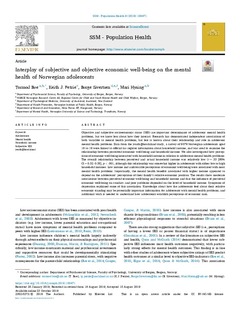| dc.contributor.author | Bøe, Tormod | |
| dc.contributor.author | Petrie, Keith James | |
| dc.contributor.author | Sivertsen, Børge | |
| dc.contributor.author | Hysing, Mari | |
| dc.date.accessioned | 2020-01-20T13:42:47Z | |
| dc.date.available | 2020-01-20T13:42:47Z | |
| dc.date.created | 2019-11-18T12:18:57Z | |
| dc.date.issued | 2019 | |
| dc.identifier.citation | SSM - Population Health. 2019, 9 1-8. | nb_NO |
| dc.identifier.issn | 2352-8273 | |
| dc.identifier.uri | http://hdl.handle.net/11250/2637069 | |
| dc.description.abstract | Objective and subjective socioeconomic status (SES) are important determinants of adolescent mental health problems, but we know less about how they interact. Research has demonstrated independent associations of both variables to mental health problems, but less is known about their relationship and role in adolescent mental health problems. Data from the youth@hordaland study, a survey of 9079 Norwegian adolescents aged 16 to 19 were linked to official tax register information about household income, and was used to examine the relationship between perceived economic well-being and household income. We also investigated how perceptions of economic well-being interacted with household income in relation to adolescent mental health problems. The overall relationship between perceived and actual household income was relatively low (r = .33 [95% CI = 0.32–0.35], p < .001, although this relationship was somewhat higher in adolescents with either low or high household incomes. Low income and unfavorable perceptions of economic well-being were associated with most mental health problems. Importantly, the mental health benefits associated with higher income appeared to depend on the adolescents' perceptions of their family's relative economic position. The results show moderate associations between perceived economic well-being and household income and that the influence of perceived economic well-being on conduct- and peer problems depended on the level of household income. Symptoms of depression explained some of this association. Knowledge about how the adolescents feel about their relative economic standing may be potentially important information for adolescents with mental health problems, and additional work is needed to understand how adolescents establish perceptions of economic rank. | nb_NO |
| dc.language.iso | eng | nb_NO |
| dc.publisher | Elsevier | nb_NO |
| dc.rights | Attribution-NonCommercial-NoDerivatives 4.0 Internasjonal | * |
| dc.rights.uri | http://creativecommons.org/licenses/by-nc-nd/4.0/deed.no | * |
| dc.title | Interplay of subjective and objective economic well-being on the mental health of Norwegian adolescents | nb_NO |
| dc.type | Journal article | nb_NO |
| dc.type | Peer reviewed | nb_NO |
| dc.description.version | publishedVersion | nb_NO |
| dc.source.pagenumber | 1-8 | nb_NO |
| dc.source.volume | 9 | nb_NO |
| dc.source.journal | SSM - Population Health | nb_NO |
| dc.identifier.doi | 10.1016/j.ssmph.2019.100471 | |
| dc.identifier.cristin | 1748749 | |
| dc.description.localcode | © 2019 The Authors. Published by Elsevier Ltd. This article is available under the Creative Commons CC-BY-NC-ND license and permits non-commercial use of the work as published, without adaptation or alteration provided the work is fully attributed. | nb_NO |
| cristin.unitcode | 194,65,35,0 | |
| cristin.unitname | Institutt for psykisk helse | |
| cristin.ispublished | true | |
| cristin.fulltext | original | |
| cristin.qualitycode | 1 | |

